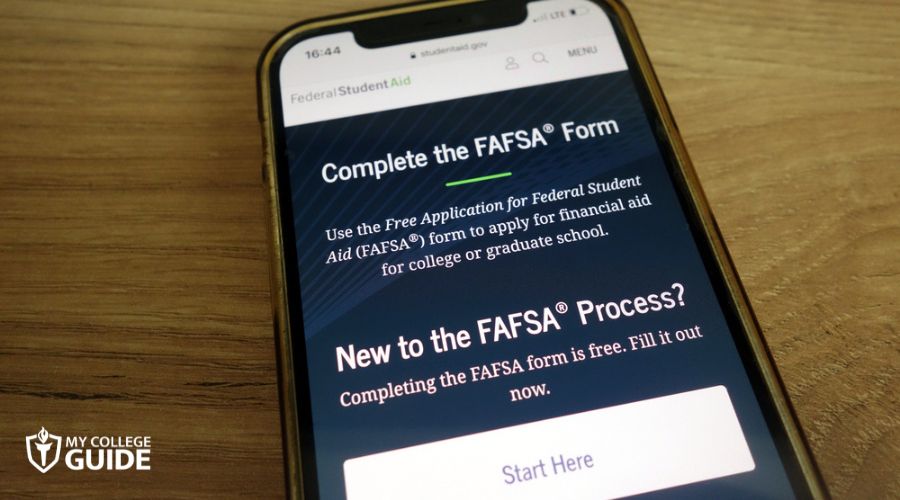Whether you are a first-time college student or an adult returning to college after a long absence, online colleges and degree programs can offer you flexibility.

Choosing an online college can offer you the option to complete your degree on your own time and set your own schedule. This can be helpful for working professionals, parents, caregivers, and more.
Editorial Listing ShortCode:
But enrolling in college is a big decision, so we’ve created this online college guide to help you better understand some of the differences between online college vs. traditional college, how much it costs, and what your options are.
Online Colleges

Online colleges offer students the chance to complete their education entirely online in the comfort of their own home or location, and on their own schedule. This can be ideal for those looking to finish or go back to school but they have other responsibilities that prevent them from doing so.
Editorial Listing ShortCode:
Online degree programs can be completed all online without the need to go to the campus, or you can opt for a hybrid program that allows for both traditional learning on campus and online courses. Hybrid programs offer a bit less flexibility but can give you the in-person instruction you may need for difficult courses.
Many schools are now offering online courses and degree programs. Some of the most common include:
- Business Administration
- Accounting
- Marketing
- Healthcare Management
- Nursing
- Computer Science
Some of the various courses you may study within these programs include:
- Business Management
- Data Analytics
- Market Research
- Medical Ethics
- Data Security
It’s important to note that some online degree programs may require you to go to campus to complete labs or various projects. Be sure to check with each degree program you are researching. While this is just a small list, there are many other degree paths available online. Once you have an idea of the degree you’d like to earn, you can start making a list of online colleges offering that specific degree path.
Types of Online Colleges

There are a number of ways to obtain the education and training necessary to reach your career goals. Each option has its advantages and disadvantages, so we have gathered some of the most important information to help you decide.
- Trade Schools: Trade schools are suited for people who have a clear idea of what they want to do and who already work in the field and want to advance. Trade schools tend to have lower costs and higher acceptance rates.
- 2-Year Colleges: Non-traditional students/adult learners, students who need to save money, students who are unsure of their career goals, and students who need training or certification may find 2-year colleges, or community colleges, ideal for them.
- 4-Year Public Universities: These schools are ideal for students who want an opportunity to explore many subjects and students who want to continue on to more advanced degrees. Various 4 year online colleges offer a wide selection of majors and opportunities.
- Private Not-For-Profit Universities: These universities are suited for students who want prestige and students who want a challenging program. These schools tend to be more expensive than public schools and have a competitive acceptance process. However, financial aid is available and there is a wide selection of majors.
There is no ideal type of college, as each one meets the needs of a different student. Choose a college that fits your specific needs and goals.
How to Know if an Online College is Right for Me

Is online college right for you? In order to determine whether or not online college is a good fit for you, you will have to do some self-reflection.
Here are a few steps to get you started:
- Know yourself: Many online classes do not follow a week-to-week schedule, so you will be expected to work at your own pace and complete everything by the end of the term.
- Assess your access: Online courses require a fast, reliable, and up-to-date computer and internet connection. You may also need a printer, webcam and headset, flash drive, and other software or tools related to your field of study.
- Try before you buy: Massive Open Online Courses (MOOCs) are free, no-credit online courses that are open to anyone. What better way to find out how well you do on your own?
It is important to think about these things and be realistic about your specific circumstances. While online learning is a great option that allows tremendous flexibility and convenience, some students truly need the structure of in-person learning.
Pros and Cons of Online College Programs
Millions of students from around the world are opting to pursue their college degrees online. When considering what are the benefits of online college, it’s important to consider not only the pros of online learning but also the cons.
| Pros | Cons |
|
|
Online learning is extremely adaptable, allowing you to keep your existing commitments and simply add school in. If you manage your time well and can stay disciplined about getting things done, this learning method may be an ideal choice for you.
How to Choose an Online College

There are many reputable online colleges out there, but not all will be a good fit for you. Take the time to consider these questions:
- What are your professional goals?
- Does the school offer the program/major you’re looking for?
- Does the school offer the degree level you’re looking for?
- How will classes fit into your schedule?
- How long will it take to complete the program?
As you consider these questions and narrow down your list, you may also wish to consult college rankings and reviews online.
Follow these steps to help you select an online college.
- Determine whether the school is accredited: Choosing an accredited online college is very important. To become accredited, colleges must meet certain quality standards that are established and evaluated not by the U.S. Department of Education, but by private agencies.
- Select the degree level you will need: A first consideration for the pros and cons between online classes vs. traditional classes is how long it will take to complete. Which degree level you choose to pursue will depend largely on your career goals.
- Consider the amount of flexibility you need: A primary benefit to online learning is flexibility, and only you know how much flexibility you need. Whatever your needs are, there is likely an online college program that is flexible enough to accommodate you.
- Decide on a major: Online schools offer hundreds of majors to consider, ranging from business to art, from nursing to criminal justice. Some common choices include business administration, nursing, accounting, communications, finance, healthcare administration, and marketing.
Once you have decided on a major and your personal needs for your degree program, you can start researching online schools and narrowing down your list that fits your needs.
Online Schools Admissions Requirements

Each online degree program has specific admissions requirements. These are some common criteria:
- Test scores (if required)
- Transcripts
- References
- Essay
While each school may vary, these are common for most. For more specific criteria, you can contact the school’s admissions office.
Online Degree Programs Accreditation

By going through the accreditation process, universities, and colleges ensure they offer a quality education to their students that will benefit graduates throughout their future careers.
Editorial Listing ShortCode:
Additionally, if you plan on furthering your education with a graduate-level biology degree, many schools will only accept credits completed from accredited colleges. The U.S. Department of Education recognizes several accrediting agencies, and it is useful to have a general understanding of which agencies are recognized for your region and degree program.
How to Pay for Your Online Degree

College is an expensive endeavor but knowing how much online education costs, what assistance is available, and how you can save money can help you prepare.
The cost of an online degree will vary greatly, depending not only on the school but also on the type of school (public or private, for-profit or not-for-profit), whether the student is in-state or out-of-state, and the chosen degree level and major.
As you consider online colleges outside your state of residence, be sure to ask the admissions or financial aid department about the school’s in-state vs out-of-state tuition policy for online learners.
When considering how to pay for your online degree, there are many options:
- Financial Aid: Complete the FAFSA to find out if you are eligible for grants, low-interest student loans, or work-study opportunities. Also, look into state and local aid available to you.
- Employer Tuition: Ask your employer about tuition assistance programs.
- Scholarships: There are a vast number of scholarships available to students looking to continue their education.
- Payment Plans: Ask the school about college payment plan options.
- Student Loans: Look into private student loans that can help you finance your college education.
You can look for scholarships by using search engines as well as by checking local businesses, community organizations, churches, and professional organizations Don’t forget to check with the school to which you are applying to see if they have scholarship opportunities.
For more options, check out our guide on the various types of scholarships available. There are also a wide variety of ways that students can save on their college education costs. For example, online students save by avoiding the following expenses:
- Dorm housing
- Campus meal plans
- Commuting costs and parking fees
- Textbook fees
- Activity fees
While college can be expensive, there are many options to help you pay for your education, and also options to help you save while studying.
What Are Online Colleges?

Online colleges are schools that offer degree programs and courses completely online, which means you can complete your coursework anywhere with your computer and an Internet connection. Traditional brick-and-mortar colleges and universities offer degree programs that can be completed partially or entirely online.
Online colleges offer students flexibility and the opportunity to complete their degree or various courses using their own computer and Internet connection. This can be helpful for working parents, those with an established career, or other situations that make traditional college difficult.
Are Online Degrees Legitimate?

Yes, online degree programs are legitimate. It’s helpful to keep in mind that while there are “degree mill” types of schools so be on the lookout for any online programs that claim to be accredited.
The best online colleges are accredited. A truly accredited online school will have met the high academic standards set by one of the accrediting agencies. You can find a list of accredited online colleges on the U.S. Department of Education’s website.
Does Location Matter for Online Schooling Programs?

One of the main benefits of online schooling programs is that you can attend from anywhere. Location will be a factor if you choose a hybrid program that combines online learning with on-campus learning, or if you choose a degree program that requires you to complete labs or projects on campus.
Editorial Listing ShortCode:
When choosing an online program, keep your degree and required coursework in mind. Most programs can be completed anywhere that has a stable Internet connection.
How Much Do Online College Programs Cost?

When you compare online college degrees, keep in mind that the average total cost of an online degree varies as there are many factors that influence the cost of college. Although tuition varies, you can expect to pay between $315 to $625 per credit hour when pursuing your degree online.
The cost will vary depending on the school you choose and the degree program. You will also want to factor in additional costs such as travel expenses, books, activity fees, and food.
What Online Degrees Are in High Demand?

Are you wondering, “what kind of degree can I get online?” You can get a degree of any level (certificate, undergraduate or graduate) in nearly any field online.
Some of the common online degrees are in the:
- Accounting / Finance
- Business Administration
- Computer Science
- Education
- Engineering
- Healthcare Management
- Logistics / Supply Chain Management
- Marketing
- Nursing
- Paralegal
But these are just a few examples. You can pursue an online degree in almost any field, without having to sacrifice your family or work obligations.
How Long Does it Take to Get a Degree Online?

The time it takes to get a degree online depends on your personal schedule and time commitment.
If you follow a traditional, 16-week semester and attend full-time, it will take four years for a bachelors degree. If you follow an 8-week semester and stay continuously enrolled year-round, you can finish in less time.
You can also opt for accelerated degree programs, which can allow you to complete your degree quicker but will require you to likely fit more hours or courses into your school schedule. Accelerated programs can be ideal for those looking to advance their career.
Are Online University Degrees More Affordable?

Is online college cheaper? It might be. Usually, colleges with online programs charge the same tuition rate for online and on-campus students. There are some additional expenses that online students avoid, like travel and food expenses.
If you commit to military service, you may qualify for a tuition-free program. Exceptional athletic or music talent may also allow you to earn a degree for free. And finally, some colleges offer free tuition to a limited number of low-income students.
Editorial Listing ShortCode:
Massive Open Online Courses, called MOOCs, are online, college-level courses available to large-scale populations for free.
What’s the Difference Between Synchronous vs. Asynchronous Online Colleges Classes?
There are two formats that colleges with online classes typically offer: asynchronous and synchronous.
| Asynchronous Classes | Synchronous Classes |
|
|
There are benefits and drawbacks to both formats, so consider which would suit your learning style best.
What’s the Difference Between In State vs. Out of State Tuition Expenses?
When it comes to traditional schooling, the differences between in-state and out-of-state public school tuition can vary greatly. In addition to other expenses like:
| In-state Tuition Expenses | Out-of-state Tuition Expenses |
|
|
As you consider online colleges outside your state of residence, be sure to ask the admissions or financial aid department about the school’s in-state vs out-of-state tuition policy for online learners.
Are Online Degrees Worth It?

Yes, an online college is worth it for many students. Earning a degree from one of the many online universities can improve your prospects for employment and your earning potential.
According to the U.S. Bureau of Labor Statistics (BLS), business and financial occupations are projected to grow 7% over the next 10 years. earning your online business degree can offer a wide variety of opportunities for you.
Editorial Listing ShortCode:
Alternatively, if you are looking for a more creative degree option, marketing positions advertising, promotions, and marketing managers are projected to grow 10% over the same time period.
Best Universities With Online Degree Programs
Methodology: The following school list is in alphabetical order. To be included, a college or university must be regionally accredited and offer degree programs online or in a hybrid format.

American Public University offers associates through doctoral degree programs online. Areas of study offered include education, business, health sciences, engineering, and global studies.
Courses are typically taught in an asynchronous format and are usually offered in 8 week sessions. There are commonly start dates offered every month. Some programs may grant transfer credits based on military service, on-the-job training, and real-world experience.
APUS is accredited by the Higher Learning Commission.

Arizona State University offers over 300 online programs, including both degrees and certificates. Potential programs include art and design, business, computer science, education, STEM, and social science. Courses are typically 6 to 7.5 weeks long, and most are taught in an asynchronous format. Most programs have 6 start dates each year. U.S. News & World Report named ASU in the top 10 schools for online bachelor’s degrees.
ASU is accredited by the Higher Learning Commission.

Capella University offers over 160 undergraduate and graduate degree programs online. Potential programs include business, psychology, nursing, healthcare administration, and advanced studies in human behavior. Most programs offer either a traditional online setting with asynchronous assignments and set due dates or a self-paced FlexPath program. Courses are typically 10 weeks long.
Capella University is accredited by the Higher Learning Commission.

Colorado State University offers online bachelors, masters, and doctoral degree programs online. Areas of study offered include anthropology, economics, journalism, education, political science, and engineering. Online programs typically charge in-state tuition regardless of residency. Courses usually follow a regular semester schedule with fall, spring, and summer start dates.
Colorado State University is accredited by the Higher Learning Commission.

DeVry University offers degree programs both fully online and in a hybrid format through any of its 40 campuses. Associates, bachelor’s, and master’s degrees and professional certificates are offered in areas such as technology, healthcare, accounting, and media arts. Courses are typically 8 weeks long, and there are start dates every 8 weeks. Most programs offer 1 to 1 support with on-demand tutoring available 24 hours per day.
DeVry University is accredited by the Higher Learning Commission.

Excelsior University offers online degree programs in areas of study such as business, health sciences, liberal arts, nursing, public service, and technology. Associates, bachelors, and masters degree programs are typically available. Classes are on average 8 weeks long and start every 8 weeks. Credit for prior life and work experience may be granted by some programs.
Excelsior University is accredited by the Middle States Commission on Higher Education.

Florida International University offers over 100 online degree programs. Classes are typically taught in an asynchronous format. Some courses follow a semester schedule, while others are accelerated. FIU has 20 years’ experience offering programs in online education, and has an R1 Carnegie ranking, which is the highest research classification offered by the Carnegie Foundation for the Advancement of Teaching.
Florida International University is accredited by the Southern Association of Colleges and Schools Commission on Colleges.

Golden Gate University offers both undergraduate and graduate degree programs online. Some classes typically offer asynchronous learning, while others may have live virtual meetings. Areas of study offered include management, accounting, psychology, and data analytics. Up to 93 credits for previous education, military, or work experience may be transferred into some programs.
GGU is accredited by WASC Senior College and University Commission.

Grand Canyon University offers bachelor’s, master’s, and doctoral degree programs online. Areas of study offered include Christian studies, autism spectrum disorders, history, secondary education, marketing and advertising, and organizational leadership. Most courses are taught in an asynchronous format. Classes tend to be 7 or 8 weeks long and often have weekly start dates.
GCU is accredited by the Higher Learning Commission.

Indiana University offers associates through doctoral degrees, and most programs are fully online. Some programs may offer hybrid options. Areas of study offered include applied statistics, environmental health, and instructional systems technology. Courses tend to follow a regular semester schedule with fall, spring, and summer start dates. Most courses are asynchronous, but a few may have synchronous components.
Indiana University is accredited by the Higher Learning Commission.

Johns Hopkins University offers a variety of online degree programs through its various schools. Areas of study offered include arts and music, humanities, social and natural sciences, engineering, international studies, education, business, and health professions. All online programs are at the graduate level. Some programs offer asynchronous learning options.
Johns Hopkins University is accredited by the Middle States Commission on Higher Education.

Liberty University offers bachelor’s, master’s, and doctoral degree programs online, with some requiring short intensives on campus.
Areas of study offered include accounting, criminal justice, education, government, marketing, psychology, and religious studies. Courses are typically 8 weeks long, but some are 14 or 17 weeks each. Credit may be awarded for prior learning experience. Classes at Liberty are taught from a biblical perspective.
Liberty University is accredited by the Southern Association of Colleges and Schools Commission on Colleges.

Louisiana State University offers over 100 online degree programs and certificates. Areas of study offered include business analytics, communication studies, computer science, business administration, mathematics, public health, and sociology. Tuition is typically charged at the same rate regardless of residency. Classes tend to be 7 weeks long and there are often 6 start dates throughout the year.
Louisiana State University is accredited by the Southern Association of Colleges and Schools Commission on Colleges.

Oklahoma State University offers a large variety of degree and certificate programs online. Areas of study offered include nursing, computer science, finance, marketing, forensic sciences, and early child care and development.
Most courses are taught in a regular 16 week format and are commonly offered in the fall, spring, and summer. Oklahoma State University was ranked the top online college in Oklahoma by Intelligent.com.
Oklahoma State University is accredited by the Higher Learning Commission.

Pennsylvania State University offers a number of fully online degrees through its World Campus, from associates through doctoral degrees. Courses are typically taught in an asynchronous format with weekly due dates for coursework. Terms usually follow a regular academic schedule with start dates in the fall, spring, and summer.
Pennsylvania State University is accredited by the Middle States Commission on Higher Education.

Purdue University offers over 200 online degree and certificate programs online or in a hybrid format, including associates through doctoral degrees.
Most programs are fully online, while some are taught in a hybrid format. Areas of study offered include agriculture, communication, engineering, nursing, psychology, and pharmacy. Courses are typically 10, 12, or 16 weeks long, and most are offered in the fall, spring, and summer.
Purdue University is accredited by the Higher Learning Commission.

Rasmussen University offers over 50 online degree programs, from associate’s through master’s degrees, along with professional certificates.
Areas of study include computer science, healthcare management, finance, healthcare management, and marketing. Courses are usually taught in an asynchronous manner, but virtual lectures are sometimes offered at a scheduled time. Classes are typically 5.5 weeks long, and there are commonly several start dates per year.
Rasmussen University is accredited by the Higher Learning Commission.

Saint Leo University offers over 60 undergraduate and graduate programs online. Areas of study include accounting, biology, logistics, management, and marketing. Courses are usually taught over 8 week sessions, and there are typically 6 yearly start dates. Niche named Saint Leo University one of the best online colleges in the country.
Saint Leo University is accredited by the Southern Association of Colleges and Schools Commission on Colleges.

Southern New Hampshire University offers over 200 degree programs online, from associates through doctoral degrees, in a variety of fields such as business, criminal justice, engineering, liberal arts, and social science. Undergraduate classes are typically 8 weeks long with 6 yearly start dates. Graduate programs are usually 10 weeks long.
SNHU is accredited by the New England Commission of Higher Education, Inc.

Strayer University offers online degree programs designed with adult learners in mind. Courses are typically 11 weeks long, and 1 or 2 classes are commonly taken per term. The school offers a laptop loan program to help with the completion of classwork. Courses are often taught in an asynchronous manner and some general ed courses may be offered at no cost.
Strayer University is accredited by the Middle States Commission on Higher Education.

Temple University offers a number of undergraduate and graduate degrees and certificate programs online. Some courses may be taught in an asynchronous format, while others may have online components. Potential programs include social work, occupational therapy, and travel and tourism. Courses are usually taught during a 7 week term or on a regular semester schedule.
Temple University is accredited by the Middle States Commission on Higher Education.

Thomas Edison State University offers associates through masters degrees along with professional certificates online.
Areas of study offered include computer science, international studies, electrical technology, cybersecurity, and entrepreneurship. Courses generally range from 8 to 16 weeks in length and often have several start dates each year, depending on the program. Credit for professional experience may be awarded by some programs.
Thomas Edison State University is accredited by the Middle States Commission on Higher Education.

Thomas Jefferson University’s online learning program offers bachelors, masters, and doctoral degrees as well as professional certificates. Some programs have a hybrid option.
Potential programs include behavioral and health services, human resource management, information technology, and organizational management. Some programs are taught in an accelerated format with 8 week courses. There are typically several start dates per year.
Thomas Jefferson University is accredited by the Middle States Association of Colleges and Schools.

Students at Union Institute & University can earn bachelors through doctoral degrees either fully online or in a hybrid format. Courses may be available part- or full-time. Courses are commonly taught using an accelerated calendar, and there are usually many start dates throughout the year. Union typically doesn’t require test scores for admission.
Union Institute & University is accredited by the Higher Learning Commission.

The University of Central Florida offers over 100 online programs, including bachelor’s, master’s, and doctoral degrees, as well as certificate programs. Popular programs include psychology, criminal justice, and anthropology.
Courses are typically taught following a traditional semester schedule. U.S. News & World Report named the University of Central Florida among the top 10 schools in the country for online bachelor’s degrees.
The University of Central Florida is accredited by the Southern Association of Colleges and Schools Commission on Colleges.

The University of Florida offers bachelors through doctorate programs online. Areas of study offered include anthropology, biology, geography, journalism, nursing, and psychology.
Some programs offer learning in a self-paced format. Courses are typically 16 weeks long and are commonly offered in fall, spring, and summer. U.S. News & World Report ranked the University of Florida as the best school in the nation for online bachelor degrees.
The University of Florida is accredited by the Southern Association of Colleges and Schools Commission on Colleges.

The University of Louisville offers over 50 bachelors, masters, and doctoral degree programs entirely online along with a number of professional certificates. Potential programs include accountancy, communication, criminal justice, nursing, political science, and psychology. Many of the courses are taught in an asynchronous format and commonly offer 5 and 8 week accelerated courses.
The University of Louisville is accredited by the Southern Association of Colleges and Schools Commission on Colleges.

The University of Maryland Global Campus offers over 125 online degree and certificate programs, including bachelors, masters, and doctoral degrees. Areas of study offered include biotechnology, graphic communication, legal studies, public safety, and software development. Most courses are taught in an asynchronous format, and are typically 8 weeks long. Most programs offer multiple start dates per year.
The University of Maryland Global Campus is accredited by the Middle States Commission on Higher Education.

The University of Minnesota offers over 100 online programs leading to bachelor’s through doctoral degrees as well as online professional certificates. Many of the programs feature asynchronous learning formats. Courses typically follow a regular semester schedule with start dates commonly offered in the fall, spring, and summer.
The University of Minnesota is accredited by the Higher Learning Commission.

The University of Missouri offers over 375 programs taught primarily online, including bachelor’s, master’s, and doctoral degree degree programs.
Programs on offer include communication, counseling, economics, English, history, journalism, and philosophy. Some programs are semester-based and have either 8 or 16 week semesters and may be taught in both synchronous and asynchronous formats. Other programs may be self-paced.
The University of Missouri is accredited by the Higher Learning Commission.

The University of Phoenix offers over 100 degree programs, from associates through doctoral degrees, all entirely online. Areas of study offered include business, technology, healthcare, nursing, criminal justice, and psychology, and an MBA program. Most courses are commonly taught in an asynchronous format and are typically 5 or 6 weeks long. There are usually start dates every 5 to 6 weeks.
The University of Phoenix is accredited by the Higher Learning Commission.

The University of West Florida offers online programs taught in an asynchronous format for bachelors, masters, and doctorate degrees as well as certificates. Programs on offer include accounting, maritime studies, finance, human resources, and supply chain management. Courses are typically either 8 or 16 weeks long and there are often several start dates throughout the year.
The University of West Florida is accredited by the Southern Association of Colleges and Schools Commission on Colleges.

Utah State University offers online programs in over 70 areas of study, including associates through doctoral degrees and undergraduate and graduate certificates. Potential programs include agribusiness, physical and sport education, and career and technical education. Most courses are taught in an asynchronous format and are either 7 or 16 weeks long.
Utah State University is accredited by the Northwest Commission on Colleges and Universities.

Walden University offers over 100 online degree programs, including bachelors through doctoral degrees, and certificates. Areas of study on offer include communications, counseling, nursing, psychology, public policy, and social work and human services. Classes commonly lasting 8 weeks or self-paced courses may be taken, and most are offered asynchronously.
Walden is accredited by the Higher Learning Commission.

Western Governors University offers a variety of self-paced online degree programs for both bachelor’s and master’s degrees. Potential programs include data analytics, marketing, IT management, finance, mathematics, and an MBA. Tuition is typically charged for a 6 month period and as many courses as desired may be taken. This may result in earning a degree faster than in a traditional online setting.
Western Governors University is accredited by the Northwest Commission on Colleges and Universities.
Find Online Colleges by State
Even though online college schools open the door to schools worldwide, some students choose to enroll in a school right in their home state.
If you’d like to find an online college degree program in your state, check out our listings by state.
- Alabama
- Alaska
- Arizona
- Arkansas
- California
- Colorado
- Connecticut
- Delaware
- Florida
- Georgia
- Hawaii
- Idaho
- Illinois
- Indiana
- Iowa
- Kansas
- Kentucky
- Louisiana
- Maine
- Maryland
- Massachusetts
- Michigan
- Minnesota
- Mississippi
- Missouri
- Montana
- Nebraska
- Nevada
- New Hampshire
- New Jersey
- New Mexico
- New York
- North Carolina
- North Dakota
- Ohio
- Oklahoma
- Oregon
- Pennsylvania
- Rhode Island
- South Carolina
- South Dakota
- Tennessee
- Texas
- Utah
- Vermont
- Virginia
- Washington
- West Virginia
- Wisconsin
- Wyoming
Choosing a college in your state can offer many cost-saving benefits, and give you the opportunity to also visit the campus if needed.
Getting Your Degree in College Online

Starting or continuing your college education online can be a great choice for working parents, caregivers, and more.
Going back to school is a big decision, but it may be necessary in order to change fields or earn a promotion or raise. If you’re on the fence, our article on going back to school as an adult can help you make a decision. Earning your college degree online can offer flexibility, cost savings, and career advancement.
To start your education journey, start researching accredited online schools today!
